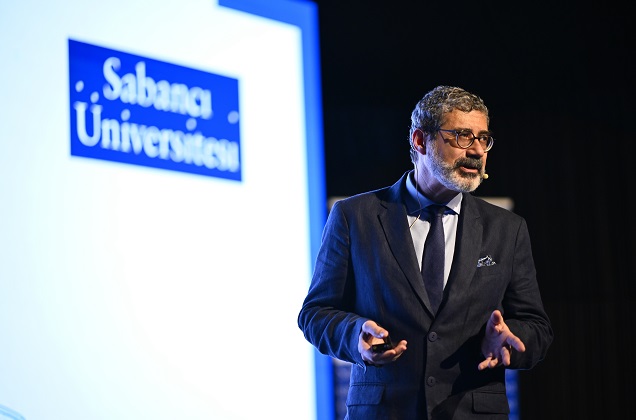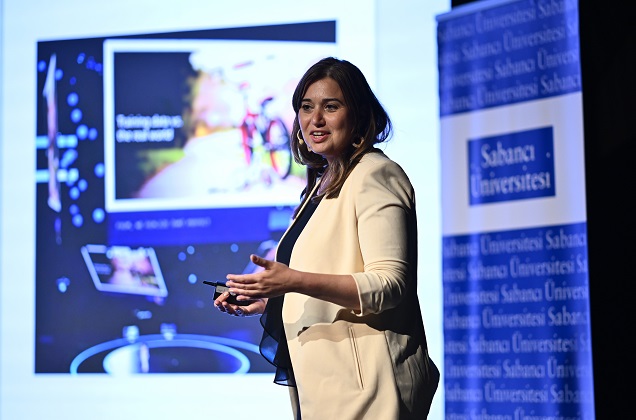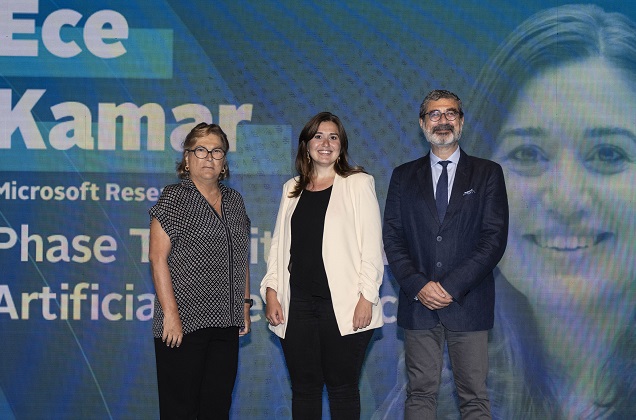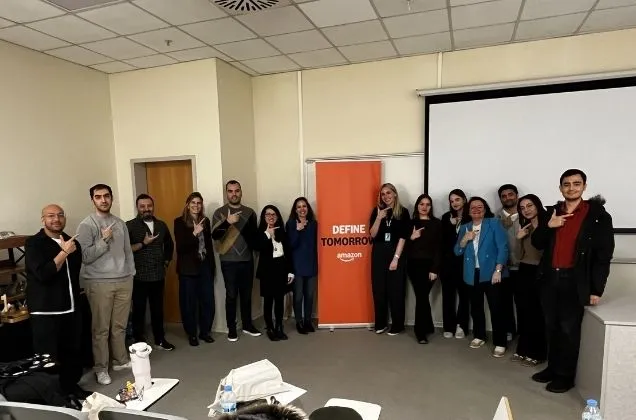21/07/2023
Sabancı University hosted Ece Kamar, a Partner Research Area Manager and Deputy Laboratory Director at Microsoft Research, who carries out important work in the field of artificial intelligence, at a special event. Sabancı University President Yusuf Leblebici made the opening speech of the event attended by Güler Sabancı, the founding chair of Sabancı University Board of Trustees, held at the Sakıp Sabancı Museum. Emphasizing the importance of artificial intelligence, Yusuf Leblebici said the following:

“The scientific world has been working for nearly 50 years to develop models that resemble neural networks in the human brain, consisting of approximately 86 billion interconnected cells. The reason why progress in this area was not as fast as desired until recently was that there was not enough 'data' to 'train' these models. The launch of the first smartphone in 2007 is an important milestone in this regard. With these devices, everyone has a data generator in their pocket. All of a sudden, there was a huge repository of data containing billions of images, texts, and materials that could be used to train machines. The main factor driving the transformation in the field of artificial intelligence, which we have witnessed in recent years, has been the 'data pool' created by smartphones and the internet.”
Stating that artificial intelligence has become a dominant element in a very short time, Yusuf Leblebici said, “Today, artificial intelligence is not only capable of solving the questions asked, but also creating hallucinations. It is gradually turning into a human-like structure. We cannot move on without asking the question of what will happen to humanity. Because we are developing a "silicone life form". Artificial intelligence will either be a competitor or a helper to us humans as carbon-based life forms.”
Everyone will be able to develop artificial intelligence applications

Ece Kamar, a Partner Research Area Manager and Deputy Laboratory Director at Microsoft Research, based in Redmond (Washington), USA, stated she was glad to make a speech at Sabancı University, from which she graduated, and talked about her work in the field of artificial intelligence and the current state of technology. Emphasizing that the new phase experienced in the field of artificial intelligence in recent years is a great revolution, Kamar said: “My mission is to use artificial intelligence for the benefit of society and individuals, and at the same time to minimize the risks that this technology can bring. During my 13 years of work at Microsoft Research, I witnessed the development of artificial intelligence technologies. We saw huge development in deep learning technology between 2016 and 2018. It achieved human-like capabilities in terms of seeing in 2016, speaking in 2017, translation and reading comprehension in 2018.”
Pointing out that there has been a serious leap in the coding skills of artificial intelligence models since 2021, Kamar pointed out that there has been a radical change in the development of artificial intelligence systems with new algorithms. Kamar shared the following example on ChatGPT, one of the current artificial intelligence systems: “ChatGPT was able to write 50 lines of code last year. However, this code was not very reliable and had some errors in it. We see that GPT-4, which was introduced this year, can write 500 lines of code correctly. We care about the transition in code skill, because it shows us that the system can also improve itself in terms of writing code. The way to bring human logic to these systems is not by learning human language, but by learning the code language. As these systems improve their coding skills, they will be able to acquire new skills. Now everyone will be able to develop artificial intelligence applications with very little effort and expertise.”
Systems that can learn from their prejudices have begun to form
Kamar said that direct data entry to the ChatGPT application was completed in 2021, and that these systems are open to errors, especially in training data, and therefore, an important part of the investments to be made in this field should be on the effects it will create in the social sense. Ece Kamar, who added that artificial intelligence also contains a lot of prejudice because it learns from the data produced by humans, gave the following example: “For example, when we ask artificial intelligence to complete some sentences, we can see gender bias. When we give a sentence such as "He is a doctor, she is a..." in English, AI completes the sentence as “...a nurse”, or when we say "he is smart, ..." as “...she is beautiful”. These are well-known examples of social prejudices in early applications. ChatGPT4 can also give biased responses, but it can be made to analyze those responses and find its own biases.”

Expressing her concerns about the development of artificial intelligence, Ece Kamar stated that these models can act manipulatively and can be used for hostility, emphasizing that regulations are important in protecting society and that more studies should be done to understand and measure the capabilities of models.




